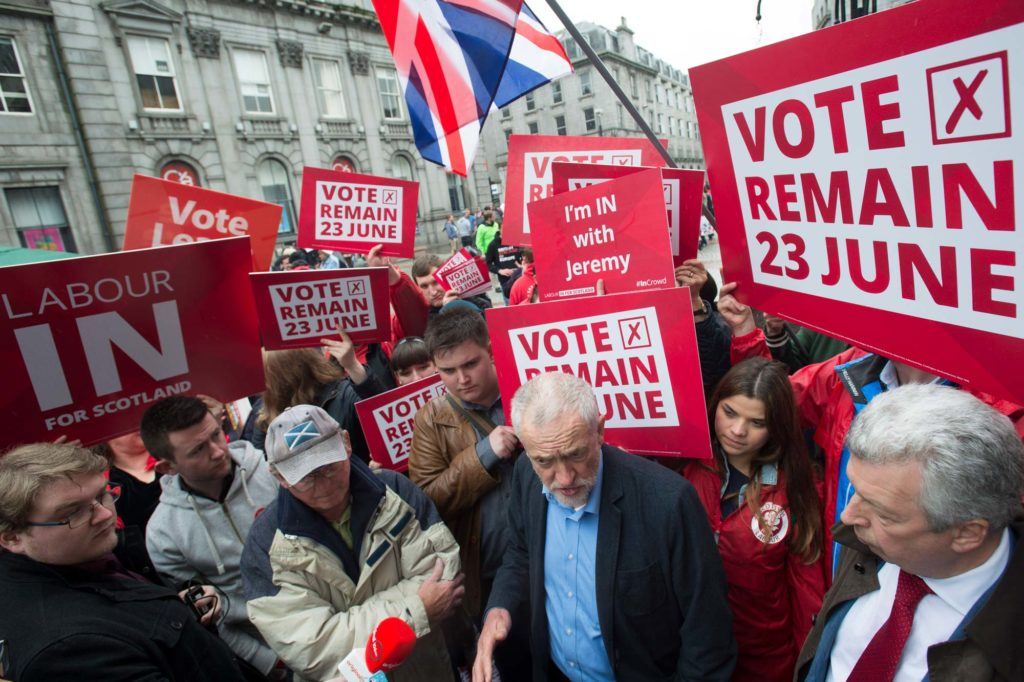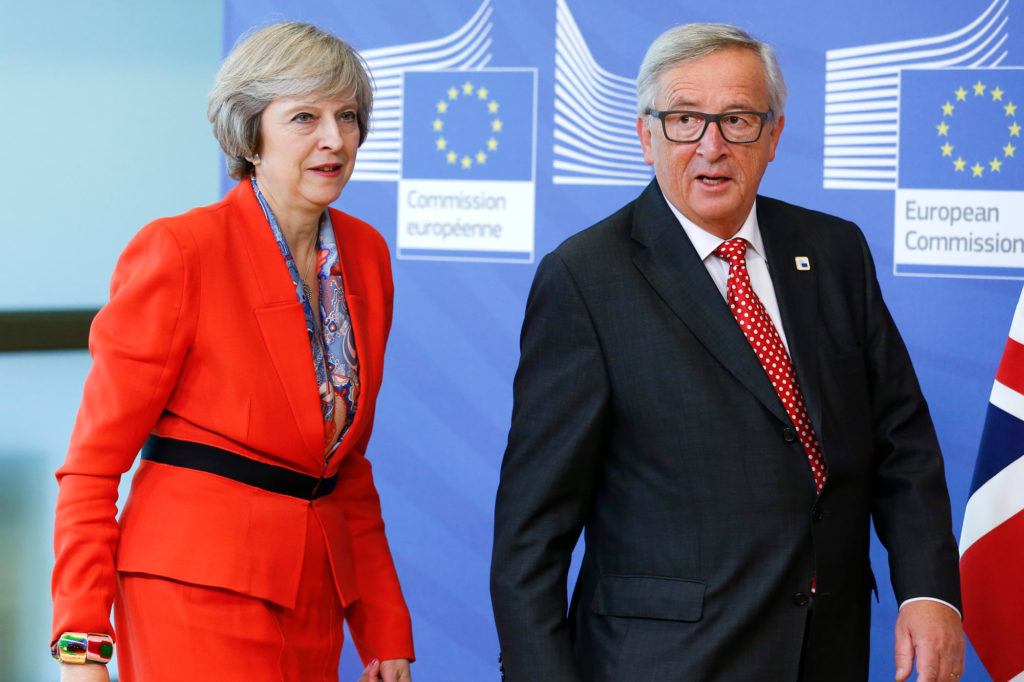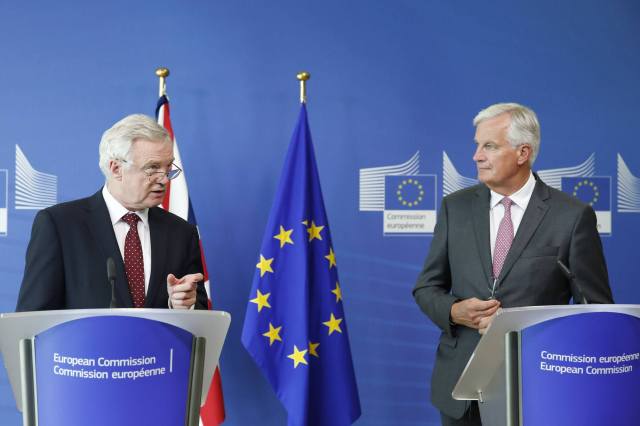Ye Pingfan/Xinhua News Agency/PA Images

When it comes to professional politics, crude tribalism so often trumps rational analysis. The leaders of political parties seem to take positions on particular issues not on principle or because they’ve read and thought deeply. They support something largely because their political opponents do not.
Party policies, then, seem to represent not the end of a process of reasoning and investigation, but ends in themselves – adopted to inflict damage to opponents or provide political ‘definition’. Over this summer of 2017, such posturing has come to define Labour’s position on Brexit.
The term Hard Brexit is now ubiquitous, used freely by the UK’s broadcast news media. The phrase makes leaving the two main legal constructs of the EU – the single market and the customs union – seem like an extreme, ideological position. Hard Brexit suggests isolation and a bleak economic future. Soft Brexit – staying inside the single market and/or the customs union – conveys, instead, a comfortable ongoing relationship with the EU, with Britain still ‘part of the club’.
A political narrative has developed that the UK would be better off economically under Soft Brexit. The corollary is that those who want to leave the single market and the customs union are driven only by an obsession with UK sovereignty and immigration controls, and are prepared for the economy to be damaged as long as they get what they want.

As such, Soft Brexit is presented as a civilized compromise that respects both the majority who voted Leave in June 2016 and the minority who backed Remain – a rejection of hard dogma in favour of enlightened common sense. These are the widely accepted terms of the UK’s Brexit debate going into the autumn of 2017, as the Article 50 talks heat up. Yet they are wrong on every level.
Leaving the single market and the customs union isn’t Hard Brexit. It is Brexit
Staying inside either arrangement while being outside the EU, would leave Britain in a dangerous halfway house – with UK laws remaining subject to rulings by the European Court of Justice. Britain would become a ‘rule-taker’, bound by huge restrictions on its economic and political freedom, but no longer able to vote on or influence those rules, even if they’re changed to the UK’s disadvantage. The UK would also still have to make multi-billion pound annual payments to Brussels and the EU’s ‘freedom of movement’ rules would apply – to the dismay of the 17.4 million UK voters who chose to leave the EU.
The economic benefits of single market membership are grossly exaggerated. Since 2002, the share of UK trade with the EU has fallen from 61% to 43%. The single market barely covers services, in which Britain excels and which account for over three quarters of the UK economy. Politicians can cite slogans about a ‘jobs-first Brexit’, insisting we stay ‘inside the single market’. But if the single market is so beneficial, why does Britain trade less with the EU than with the rest of the world? Why is the UK’s EU trade shrinking as its non-EU trade expands? And why does Britain have a large deficit on EU trade, but a sizeable surplus on trade outside the EU?
Staying in the customs union, meanwhile, means the UK must charge high import tariffs on goods where there is often no UK industry to protect. British consumers are paying more, on a range of imports from outside the EU, to shield uncompetitive producers in other EU states from cheaper global prices. Because 80% of all revenues from the EU’s Common External Tariff are paid to Brussels, and the UK does more non-EU trade than any other EU member, Britain accounts for a disproportionately high share of the EU’s combined tariff revenues. Again, this burden is shouldered by UK consumers. Being inside the customs union also forbids Britain from cutting trade deals with non-EU nations – which account for four fifths of the global economy and include the world’s fastest-growing markets.
The rest of the world trades very happily with the EU from outside the single market. The US conducted a quarter of a trillion dollars’ worth of trade with the EU in 2016, without accepting ECJ jurisdiction, freedom of movement rules or making large annual payments. Tariff-free trade between the UK and the EU can continue after Brexit under a free-trade agreement that preserves the UK’s ability to reach similar agreements across other parts of the world.
If no such agreement with the EU is possible before March 2019, when the UK is scheduled to leave, trade with the remaining 27 members can continue under World Trade Organisation rules, with the mutual recognition of standards made relatively simple given a starting point where there is, by definition, full compliance. The US and Canada meanwhile share ‘friction-free’ customs arrangements, with no customs union – and the UK and EU can achieve the same.
The single market favours the producer over the consumer, big business over small business
As summer ends, the Labour party – after months of vacillation – has just adopted Soft Brexit as party policy. No matter that the UK voted to leave the EU in the June 2016 referendum, or that Labour won 40% of the vote in the June 2017 general election on a vow of “respecting the referendum” and leaving the single market and customs union. Given the Tories’ slim Commons majority, Labour senses that if it can derail Brexit, perhaps it can topple the Government.
Who cares that, under Soft Brexit, the UK would endure all the restrictions and costs of EU membership, with none of the advantages of shaping its own laws or grasping better trading opportunities elsewhere.
The UK’s single market membership promotes the interests of producers over consumers. It entrenches the advantages of large corporations over small firms. Staying in the single market suppresses the wages of the UK’s most financially insecure workers, while helping numerous multinationals dodge tax.

Those now aggressively selling Soft Brexit must also consider that it is wholly unobtainable
Since the EU referendum, UK politicos have furiously debated the intricacies of what Brexit ‘deal’ they might accept. Yet nothing can be settled except in agreement with the EU 27 and the European Parliament. British politicians are making demands and suggestions that strike the rest of Europe as absurd – not least those earnestly backing Soft Brexit.
“The single market and its four freedoms are indivisible,” said Michel Barnier, the EU’s Chief Negotiator, in December 2016. “Cherry-picking is not an option”. Yet such cherry-picking is precisely what the Soft Brexiteers think they can get, combining single market membership with special dispensation from freedom of movement rules and other related conditions.
Labour’s Soft Brexiteers – and the Tories threatening to join them – are leading the European continent towards an extremely acrimonious Article 50 negotiation and a Brexit that maximises uncertainty for businesses and the broader public. That’s because Soft Brexit puts the UK in direct and absolute conflict with the EU’s core principles – principles that, if seriously breached, could tear the bloc apart.
In late July 2017, this point was made with devastating clarity by Fabian Zuleeg, the Chief Executive of the European Policy Centre – a think tank with very close links to the European Commission. Referring to voices “outside government demanding that the UK reconsider its position”, Zuleeg described as “misguided” any notion the EU27 would accept a treaty-busting Soft Brexit. “What is missing in these discussions is a real appreciation of the view from the other side of the channel,” said Zuleeg. “Allowing cherry picking of benefits would act as a signal to others inside the EU that a Europe à la carte is obtainable, opening the Pandora’s box of disintegration”.
Earlier this summer, Tony Blair, the erstwhile spiritual leader of Labour’s Soft Brexit brigade, said Europe is willing to “consider changes to accommodate Britain, including around freedom of movement”. The former Prime Minister’s statement, seemingly based on inside knowledge, electrified the Westminster village. It has since been demolished by Zuleeg. “The Tony Blair suggestion is unworkable,” he said, because “the EU is a community of law, underpinned by EU Treaties”. Such a deal would “be struck down in Court”, Zuleeg continued, referring to the ECJ. The day his article was posted online, it was re-tweeted by Sabine Weyand, the EU’s Deputy Chief Negotiator who works directly alongside Barnier – confirming it as official EU policy.
Brexit isn’t a choice between Hard and Soft, but between Clean and Messy
The British government was correct to declare, back in January 2017, that the UK will be outside both the single market and the customs union once the Article 50 negotiation ends in March 2019 – what I would call Clean Brexit. Not only does this fulfill the referendum outcome, it also makes diplomatic sense. Striking a free-trade agreement with the EU, or using WTO rules as a platform to strike such a deal in the future, Clean Brexit is a practical, transparent, democratically-mandated position. It also limits the inevitable uncertainty surrounding the Brexit process as much as is possible, while minimising the damage done to the UK, the EU and their vital continued relationship.
Clean Brexit means taking back full control of the UK’s laws and borders, leaving the EU in a pre-announced, planned manner – allowing for proper preparation, with the UK knowing it will be outside both the single market and customs union. The alternative is a Messy Brexit – that would damage business confidence, maximize so-called ‘cliff-edge’ dangers and risk a disastrous UK-EU stalemate.
Labour’s Soft Brexit ploy is the worst kind of politics. Cynical, and anti-democratic, it is based on a willful misunderstanding of diplomatic realities and designed to cause Parliamentary chaos. Worst of all, Soft Brexit directly contradicts Labour’s own manifesto, prioritising the wishes of the party’s metropolitan elite over voters in Labour ‘heartlands’ who backed Brexit, and swung the referendum, as they want to stop unlimited unskilled immigration undercutting local wages, while preventing further billions going to Brussels. Both changes are only possible if the UK leaves the single market.
Ida Tarbell, the celebrated American journalist after whom this column is named, was herself deeply dismayed with party politics, not least left-wing opportunists. “All the radical elements, and I numbered many friends among them, were begging me to join their movements,” she wrote in All in the Day’s Work, her 1939 biography. “I soon found that most of them wanted attacks – they had little interest in balanced findings”.
Tarbell “was convinced that, in the long run, the public they were trying to stir, would weary of vituperation”. Almost eighty years on, this is precisely the case with Brexit. Britain has voted decisively to leave the EU, with the UK Parliament and government taking back control of laws, borders, taxes and trade negotiations. Now – as the polls repeatedly show – the British public wants the political classes to get on with it.










Join the discussion
Join like minded readers that support our journalism by becoming a paid subscriber
To join the discussion in the comments, become a paid subscriber.
Join like minded readers that support our journalism, read unlimited articles and enjoy other subscriber-only benefits.
Subscribe